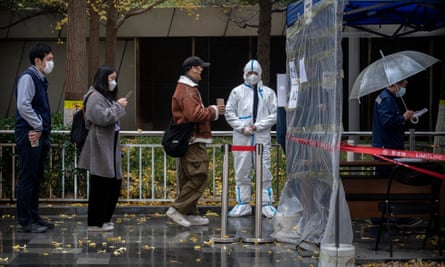China has eased some of its strict Covid rules in an apparent attempt to alleviate economic pressures and cool escalating discontent, though authorities insist their “war” against the pandemic remains unchanged.
The changes include shortening quarantine periods by two days for close contacts of infected people and for travellers arriving in the country, as well as scrapping a rule that penalises airlines for bringing in too many cases.
The move came a day after President Xi Jinping and the country’s top decision-makers in the Communist party’s politburo standing committee heard a work report on Covid measures. The announcement made by the national health commission stressed that the country “will not waver from the dynamic zero-Covid” policy, and changes were only made to “enhance” the anti-pandemic measures.
“The situation is still grave and complicated. We must maintain strategic focus and … take more resolute and decisive measures to curb the spread of the pandemic and concentrate on the extermination war in key areas,” the commission said.
At a regular press briefing, the Chinese foreign ministry spokesperson Zhao Lijian told reporters: “This certainly does not mean we can slacken in our response or even simply end Covid restrictions and ‘lie flat’ (give up). China has improved and adjusted its containment measures in response to the way the virus mutates.”
The news was cautiously welcomed by many Chinese people, who are growing increasingly dissatisfied with nearly three years of Covid curbs that are hurting the world’s second-largest economy.
“The excessive measures are most hated by us ordinary folks. I hope the officials will genuinely follow the rules,” said one user on the Weibo social media platform.
Under the new measures, centralised quarantine times for close contacts and travellers from abroad have been shortened from seven to five days. The requirement for three further days in home isolation after centralised quarantine remains.
China will also stop trying to identify “secondary” contacts – a major annoyance for residents of cities who are caught up in sweeping contact-tracing efforts when a case is found – while still identifying close contacts.
The commission said it would also develop a plan to accelerate vaccinations, which experts say is crucial before the country can begin more fully scaling back a zero-Covid policy that has made China a global outlier.

Among the new measures is an adjustment of categorisation of Covid risk areas to “high” and “low” – eliminating a “medium” category in a bid to minimise the number of people caught up in control measures.
The new steps include ending a “circuit breaker”, under which airlines faced a suspension of flights if they brought in too many Covid-infected passengers, a system that caused frequent cancellations. Still, international flights remain at a small fraction of pre-Covid levels.
The easing comes even as case numbers in China have risen to their highest level since April, with record tallies in Beijing and the central city of Zhengzhou. Numerous cities have widened localised lockdowns and other measures, including in the southern metropolis of Guangzhou.
The country reported 10,729 new cases, and more than 5 million people were confined to their homes in the southern manufacturing hub of Guangzhou and the western megacity of Chongqing.
Beijing, where the bulk of its 21 million people are undergoing near-daily testing, has closed parks and imposed other restrictions. Many city schools switched to online classes, hospitals restricted services and some shops and restaurants were shuttered, with their staff taken to quarantine. Videos on social media showed people in some areas protesting or fighting with police and health workers.
Chen Daoyin, a former associate professor at Shanghai University of Political Science and Law, said people should not get overoptimistic as the “fundamental tone” of the Chinese government has not changed.
“From the way they stress that one cannot relax and ‘lie flat’, we can see that this is a micro adjustment, not a fundamental change. The government does not think the conditions are there for a full-scale relaxation.”
“From a pessimistic point of view, so long as the virus continues to mutate … I cannot see the government changing its basic policy,” he said.
Additional reporting by Reuters and Associated Press
Stay connected with us on social media platform for instant update click here to join our Twitter, & Facebook
We are now on Telegram. Click here to join our channel (@TechiUpdate) and stay updated with the latest Technology headlines.
For all the latest Covid-19 News Click Here
